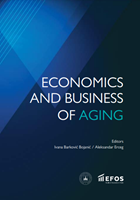EXPLORING THE ECONOMIC IMPACT OF POPULATION AGING IN SERBIA THROUGH NATIONAL TRANSFER ACCOUNTS
EXPLORING THE ECONOMIC IMPACT OF POPULATION AGING IN SERBIA THROUGH NATIONAL TRANSFER ACCOUNTS
Author(s): Ivana Poljak, Slavica Manić
Subject(s): National Economy, Demography and human biology, Financial Markets, Socio-Economic Research
Published by: Sveučilište Josipa Jurja Strossmayera u Osijeku, Ekonomski fakultet u Osijeku
Keywords: age structure; demographic transition; life cycle deficit; National Transfer Accounts;
Summary/Abstract: In demographic terms, Serbia almost entirely shares the fate of developed European countries regarding the age-structural transition, with expectations that its demographic aging will further intensify. The growing proportion of the older (an economically unproductive population segment) and the declining working-age population tend to produce adverse effects and inhibit economic growth. The existence of slight differences in the pattern of demographic transition does not imply that the economic life cycles of individuals within Europe are similar or identical. That is why our study investigates how people in Serbia produce and share resources at each age, with a particular focus on increased consumption and reduced savings in later stages of life caused by the impact of population aging, commonly known as the ‘silver tsunami’. The results are based on the transformation and analysis of the National Transfer Accounts (NTA) data provided by the Statistical Office of the Republic of Serbia (with the support of the United Nations Population Fund). Drawing on the latest available data from Serbia (in 2019) as well European-level databases, the analysis aims to explore features and peculiarities (if any) of the consumption patterns and financing of individuals in Serbia.
Book: Economics And Business Of Aging
- Page Range: 123-140
- Page Count: 18
- Publication Year: 2024
- Language: English
- Content File-PDF

